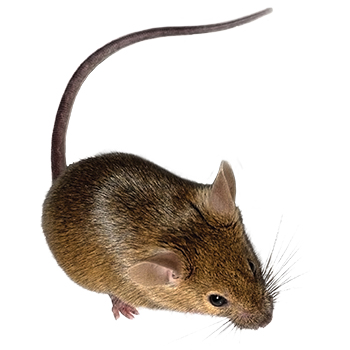Pennsylvania Mice Control

Mice are often depicted as cute little creatures in childhood stories and songs. However, when you encounter one of these tiny rodents in your pantry or your office break room, they are anything but cute. In fact, these small pests can pose a big threat to the health of anyone in your home or at your place of business. To protect your Pennsylvania home or business from mice, you need to learn about the behavior of this pest, take steps for prevention, and find effective treatment options should an infestation occur.
What Are Mice?
Mice are small mammals that can be categorized as rodents. According to the Oxford dictionary, rodents are gnawing mammals that have strong, constantly growing incisors. Mice use their incisors to gnaw on materials to build their nests and use them to get to food stored in boxes and other packaging, like plastic bags. The Pennsylvania Game Commission identifies the white-footed mouse (Peromyscus leucopus) and the house mouse (Mus musculus) as the two most common species to infest homes and businesses in Pennsylvania.
Mice come into homes and businesses in search of food, water, and shelter, finding their way inside through small holes, gaps, and breaches in the structures. It doesn’t take a big opening for these small rodents to squeeze through. Experts in the Agricultural Department at Penn State point out that mice can wiggle through space approximately the size of a pencil or dime. The Pennsylvania pest control experts at Viking Pest explain mice can also gnaw through some types of building materials such as drywall and insulation with their incisors to gain entry to your home or office building.
How to Identify Mice
Exterminators explain the white-footed mouse ranges in length from 6 to 7.5 inches and the house mouse ranges from 6 to 8 inches, including their tails. These small rodents are covered in hair and are often reddish-brown, gray, or black. Mice have large ears and long, thin tails. Many home and business owners question whether the rodent they saw was a mouse or a rat. The key differences between the pests are their size, ears, and snouts. Mice are much smaller than rats, have larger ears, and more triangular snouts.
You may find it difficult to distinguish between a mouse and a young rat, especially if you only see it while it’s on the move. You can look for other evidence to help you with identification. The Pennsylvania pest control experts at Viking Pest explain the droppings of mice are similar in shape and size to rice, while rat droppings are closer in shape and size to raisins. The most effective option for determining if you have mice in your office building or home is to seek the help of the Pennsylvania pest control professionals at Viking Pest.
What Problems Can Mice Cause for Pennsylvania Home and Business Owners?
Mice can cause serious problems for homeowners and business owners in Pennsylvania. Mice can damage items in your house or business, such as paper, fabric, and packaging, during their search for food and materials, as these pests use a variety of materials to build their nests. If you have an infestation of mice, you may notice that boxes, books, upholstery, and even building supplies like drywall and insulation have gnaw marks. The Pennsylvania pest control experts at Viking Pest state mice have also been known to chew on wires and elements inside of appliances, like your oven and dishwasher, which can lead to a fire hazard.
Mice are also a threat to the people inside of your PA house or business. Exterminators explain these rodents are willing to eat just about any type of food or pet food you keep around. This means that your pantry and kitchen areas are prime spots for mice to visit. A mouse can chew through cardboard boxes and other types of packaging, such as plastic, to get to food. When mice come into contact with your food, they can contaminate it with diseases that transmit to humans. Mice can also contaminate the surfaces in your Pennsylvania home or business with their saliva, feces, and hair.
When Are Mice Active in Pennsylvania?
The Pennsylvania Game Commission states that most types of mice that inhabit Pennsylvania are active all year long. The only common mouse in Pennsylvania that hibernates is the jumping mouse. Others maintain varying levels of activity in the winter months that depend on the type of mouse and weather conditions. In your home or business, mice don’t have to contend with severe changes in the weather and can often continue their normal activity year-round. Due to the harsh Pennsylvania winters, mice tend to seek warmth and shelter in your home or business. During the fall and winter in Pennsylvania, you may start to see an increase in mice activity indoors.
How to Control Mice in Pennsylvania
Mice pest control in Pennsylvania is most effective when you take a multifaceted approach. Prevention starts with the proper maintenance of your property. Take some time to examine the interior and exterior of your home or business building for breaches that could allow mice inside. If you currently have an infestation, the most important question is how to get rid of mice once they’re inside your Pennsylvania home or building. In order to get rid of mice in walls, attics, basements, and other areas of your Pennsylvania home or business, you need the help of the Pennsylvania pest control experts at Viking Pest. The multifaceted approach to rodent control that’s most effective is called Integrated Pest Management (IPM). IPM is created to get rid of mice at the source to ensure complete eradication and help with prevention efforts going forward.
How to Prevent Rodents During a Renovation
According to statistics, mice and other rodents invade approximately 21 million homes during the winter in the US. Besides causing extensive damage, mice can also carry a variety of diseases, including salmonella and hantavirus.
If you are renovating a home, this can open even more opportunities for rodents to get in, especially if it is left unoccupied for certain periods without rat and mice control.
To protect your home and renovating projects from mice, our mice exterminators state how to deter and eradicate them.
Clear up the Yard
During renovations, it’s easy for the yard to get cluttered. Piles of building debris and materials can mount up, as well any garbage from the remodeling/renovation process.
Unfortunately, this can create a paradise for mice. Mice love piles of wood, unraked leaves, garbage heaps, etc., explain the rodent control experts at Viking.
This gives mice cover to hide in before they make an entry into your home. To discourage this, our pest control experts recommend clearing any unnecessary heaps of building refuse. Stack materials neatly, rake up dead leaves and dispose of woodpiles.
Get Rid of Garbage and Food
Do you have any full trash cans standing about? Maybe with food containers in them? If so, you want to empty these as soon as possible.
Garbage cans can act as both a food source and a place of shelter for incoming mice.
Seal the House
If you are renovating an older house, chances are there’re some chinks and cracks here and there that mice could get through. Mice and rats and can squeeze through very small holes and crevices and find their way into your home.
To stop this from happening, and prevent mice from invading your home and its renovations, Viking’s pest management professionals recommend making it a priority to seal up your eaves, windows, doors, and vents as soon as you can in the renovation process.
How to Properly Clean After a Mice Infestation
You might think that once the mice have cleared out of your home, the problem is solved; however, if you want to keep mice out for good, it’s vital to clean the area properly as well.
The rodents will have left behind nests and rodent waste, which invites other mice back to the area. Knowing how to clean rodent waste properly requires some level of expertise, as you need to thoroughly sanitize the space and remove any trace of mice infestation.
What’s more, an unclean space also leaves behind any germs or diseases that the rodents might have brought with them. Professional and in-depth sanitation is the only way to protect yourself and your family from potential infection.
Luckily, the Viking Pest Control team offers Pro-Clean, a Disinfection, and Sanitization service to avoid this situation entirely. Viking’s Disinfection and Sanitization Treatments use a combination of several indoor disinfectant cleaning methods to reach and disinfect common and complex to reach areas in your New Jersey, Pennsylvania, Delaware, or Eastern Shore of Maryland home or business. Viking Pest Control professionals will wipe down, mist, and use aerosol devices to fog your NJ, PA, MD, or DE home or business from floor to ceiling with our disinfectant solution during each sanitization treatment.
Protecting Your Pennsylvania Home or Business From Mice With Viking Pest Control
Viking Pest offers expert treatment designed to effectively and efficiently control and prevent mice from invading your home or business in Pennsylvania. Our use of Integrated Pest Management (IPM) techniques focuses on finding the core of the pest concern and controlling mice from the source. Through IPM, pest control materials are selected and applied in a manner that minimizes risks to human health, pets, and the environment. Call Viking today for your FREE and NO OBLIGATION estimate at 1-800-618-2847 or schedule online today!















